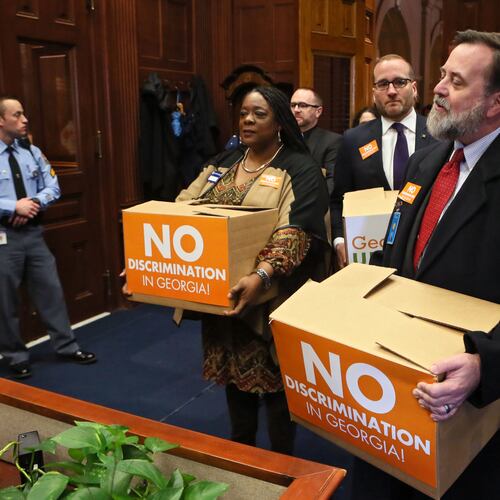Labor contract negotiations between Sandy Springs-based UPS and the International Brotherhood of Teamsters have stalled after an all-night bargaining session aimed at reaching a deal Wednesday.
The union had targeted July 5 to come to an agreement, to allow time to vote and approve a new labor contract before the union’s Aug. 1 strike deadline.
The Teamsters have more than 340,000 members at UPS, making it the largest private collective bargaining agreement in North America. A strike would cripple shipping across the country, affect millions of deliveries a day and damage UPS’s reputation with customers.
The Teamsters labor contract extends through July 31, and the union has threatened to strike Aug. 1 if it did not have a new contract agreement by that time. Last month, the union’s members voted to authorize a strike in the event that negotiations fail to reach an agreement.
It’s not the first time bargaining has broken down. Union leaders had ratcheted up pressure in the negotiations, and over the last week have pushed for faster progress in the talks. A week ago, the union walked away from the bargaining table and demanded a last, best and final offer, before returning to negotiate over the weekend.
On Wednesday morning, the Teamsters said in a statement that UPS had presented “an unacceptable offer to the Teamsters that did not address members’ needs” and said “UPS refused to give the Teamsters a last, best and final offer, telling the union the company had nothing more to give.”
But the company responded with a statement saying: “The Teamsters have stopped negotiating despite UPS’s historic offer that builds on our industry-leading pay.”
“We have nearly a month left to negotiate,” the company said. “We have not walked away, and the union has a responsibility to remain at the table.”
The union said no additional negotiations were scheduled.
UPS said in its statement: “Refusing to negotiate, especially when the finish line is in sight, creates significant unease among employees and customers and threatens to disrupt the U.S. economy. Only our non-union competitors benefit from the Teamsters’ actions.”
UPS has been losing some business to competitors as customers worry about how they would move their goods if there is a strike.
UPS CEO Carol Tomé also said in April that the company had a pipeline of potential business worth more than $6 billion, but that it was “hard to sell into... because of that Teamsters negotiation.”
“But we are going to go hard at it once we have that handshake deal,” Tomé said. “We’ve got to win faster, and we will win faster when the uncertainty is behind us” of the Teamsters negotiations.
The Teamsters union had previously announced tentative agreements on a number of terms during negotiations that started in April, including equipping new trucks with air conditioning, ending a two-tier pay system, stopping required overtime on a day drivers aren’t scheduled to work and establishing Martin Luther King Jr. Day as a full holiday.
Those gains would take effect if both sides reach a full tentative agreement and it is ratified by workers.
About the Author
Keep Reading
The Latest
Featured


